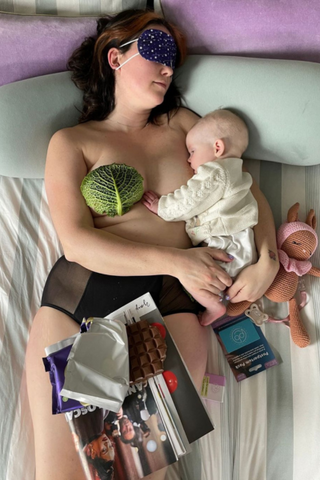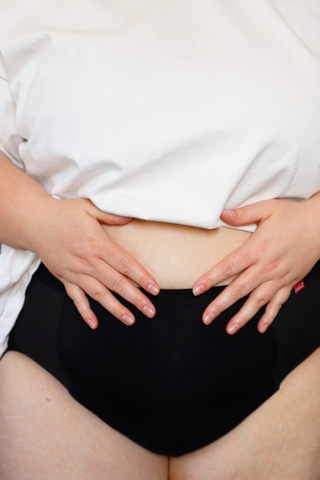 Your body goes through a lot during pregnancy and in the postpartum period. Lots of you regularly get in touch with questions about what to expect when it comes to your period post-birth, so we reached out to our friends over at TeamBump for help.
Your body goes through a lot during pregnancy and in the postpartum period. Lots of you regularly get in touch with questions about what to expect when it comes to your period post-birth, so we reached out to our friends over at TeamBump for help.Team Bump is an app designed to guide you through workouts tailored specifically for each trimester during pregnancy. They also offer nutrition guidance alongside a private online community so you can connect with others in a similar position.
Want to know more? Team Bump have also very kindly offered us a 20% discount, using code WUKA20. You can follow Team Bump on Instagram and Facebook too.
Team Bump also have a lot of information and guidance on their site for pregnant and new mums, to help you along on your journey towards parenthood. Read on to find out Team Bump's top tips on managing your period after birth.
The Return of Your Period: When?
When your period will return after giving birth varies from woman to woman. Their return is influenced by several factors:
- Breastfeeding: Breastfeeding can delay the return of periods due to the hormone prolactin, which is produced in higher levels during breastfeeding and stimulates milk production. Prolactin also suppresses ovulation, leading to a delay in the resumption of regular menstrual cycles. However, the extent to which breastfeeding affects the return of periods can vary. Some women may experience a complete absence of periods during their whole breastfeeding journey, while others may have irregular periods or a return to regular menstrual cycles even while breastfeeding.
- Hormonal Changes: After giving birth, the levels of oestrogen and progesterone, which are hormones that regulate the menstrual cycle, begin to gradually return to pre-pregnancy levels. These hormonal changes play a significant role in the timing of the return of periods after childbirth.
- Labour Recovery: The body goes through a significant recovery process after childbirth, including healing of the uterus and reproductive organs. The timing of the return of periods can be influenced by how quickly the body goes through the recovery process and can also be impacted by the mother's overall health, nutrition, and physical activity levels.
- Contraception: Some women may start using hormonal contraceptives after childbirth, which can affect the return of periods. The hormones in these contraceptives can lead to lighter periods, the absence of periods altogether or, in the case of using the contraceptive pill, they can be brought on by having a monthly break.
- Individual Factors: Every woman's body is different, and the return of periods after childbirth can vary based on individual factors such as genetics, overall health, and stress levels.
Physical Symptoms/Differences in Postpartum Periods
There are some noticeable differences in your period after giving birth, but don’t worry, these changes are down to hormonal fluctuations and your periods should settle down over time.
These changes include:
- Cramping + Flow: Cramping might be stronger than usual with a heavier flow, due to the uterus becoming larger after pregnancy and so more lining is to be shed during menstruation. In addition, your body’s blood volume can increase by up to 50% in pregnancy- this can contribute to a heavier period as your body eliminates excess blood. If you had endometriosis before pregnancy, you might find that your periods are lighter.
- Small blood clots: Blood clots can be a normal part of postpartum periods, again due to the fact that your body is shedding a higher volume of uterine lining. However, if they are larger than the size of a grape and/or more than 3 days in a row, contact your doctor or healthcare provider.
- Irregular cycle lengths: Your periods could be regular as clockwork or all over the place, all down to hormones fluctuating after pregnancy. Your cycle should settle over time, especially if your periods were regular pre-pregnancy.
- Breast milk supply + taste: This may change a little for the baby but it’s nothing to worry about. If the baby is a little fussy when feeding during your period, this is usually the reason. You’re fine to keep breastfeeding during your period.
Can I Use Tampons or Cups After Giving Birth?
Tampons and menstrual cups can increase the risk of infection in the weeks after birth, because there’s a wound where the placenta joined your uterus, but you may also have tears or stitches you need to let heal. Instead, use pads or better still, period pants. WUKA's postpartum sets are ideal for use from 2 weeks post birth, and can be used for super heavy periods as your cycle settles down again post pregnancy.
The new Stretch™️ Super are perfect for this time, as they're not only ultra-
absorbent (with 4 super absorbent layers, sucking up to 60ml blood), but they use Stretch™️ technology too. This means that one pair will fit up to 4 sizes, gently stretching with your changing body shape without ever digging in. Plus they’re environmentally friendly too. Win-win!
Tampons can be used after you’ve been cleared by your doctor at your 6 week postnatal check, but can be uncomfortable, and are not designed for women who have recently had a baby.
Can I Get Pregnant Before My Period Returns?
Yes! If you’re not breastfeeding you can ovulate as early as 21 days after giving birth. In theory, breastfeeding should keep periods at bay, BUT it can't reliably prevent pregnancy.
When to Seek Medical Advice
- You experience severe or prolonged pain during your periods.
- you have heavy bleeding that requires changing your menstrual product every 1-2 hours
- You pass blood clots that are the size of, or larger, than a grape
- you have signs of infection, such as fever, chills, or unusual discharge
We hope this helps you feel more informed about your period after birth. Please get in touch if you have any questions.
Related posts
What Happens to Your Period When You Breastfeed?
Irregular Periods After Having a Baby


